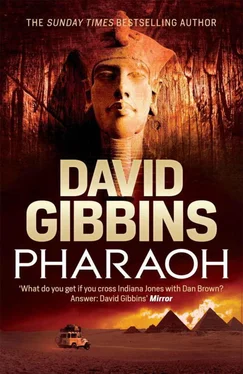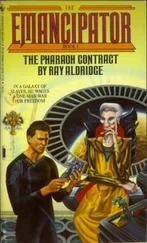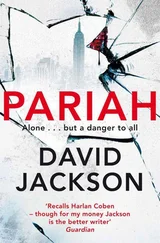Charrière reached over and handed him the paddle. ‘I’ll be waiting for you.’
Mayne nodded. ‘Before dawn. I’ll be back.’
Charrière turned and was gone. Mayne stepped towards the boat, then leaned forward and grasped it like a canoe, his left hand holding the paddle and one side of the boat, his right hand the other. He pushed off and brought his legs in, kneeling down and wobbling the boat to test its stability, then laid the paddle in front of him and reached down to splash mud over the reeds, darkening them to make the boat less visible, taking care to make as little noise as possible. After a few moments he straightened up and began paddling silently out of the creek, aiming for a window that had just lit up on the upper floor of the building on the opposite shore.
Now would begin the greatest test of his life.
Mayne let the boat glide silently towards the mudbank below the palace, crouching low and trailing the paddle with the blade held vertically to act as a rudder. For the last stretch of the river he had let the sluggish current take the boat by the stern so that he was crossing diagonally, minimising his profile both to Madhist sharpshooters who might be scanning the river from Tutti island behind him and to Gordon’s Sudanese guards watching from the palace ahead. He had seen the guards on the balustrade, openly patrolling now that it was dark and they were invisible from the island. And he thought he had caught his first glimpse of the man himself, at the upper-floor window that had lit up when he had set out from the opposite shore; the shutters had opened and a figure had stepped out on to the balcony, sharply silhouetted in the light from the room behind. It seemed cavalier in the extreme, the act of a man with a death wish, but then Mayne had seen the Sudanese soldiers below stopping and watching him, and had imagined the dervishes, too, treated to this spectacle night after night, coming to believe in the man’s invincibility.
For now, Mayne’s concern was his own vulnerability to fire from the Sudanese guards; had they spotted him, they would have seen him as an Arab in tribal dress crossing from the dervish-held shore, and would have shot him down immediately. But he had just passed under the line of sight from the balustrade, and he felt marginally safer. Once he landed, he would need to make his way along the foreshore and into the streets, where he could meld in with the locals and approach the palace gate inconspicuously.
The boat bumped into the bank, driving forward into the mud until the stem was about three feet from the end of the duckboards. It was a place that should have been swarming with rats, but then he remembered that they had long ago been chased down and eaten by the starving people in the city. He knelt as far forward on the reed matting as he could, then jammed the paddle handle-first into the mud and used it to pull himself forward, rocking the boat until it could go no further. He listened for a moment and looked up at the balustrade; seeing nothing, he launched himself on to the duckboards, feeling his holster slap against his thigh as he did so, catching his robe so it stayed free from the mud and quickly regaining his balance. The duckboards were well built, solidly anchored into the foreshore, and the boat would remain firm until he returned.
He stood upright and suddenly gagged, overwhelmed by a stench even greater than the fetid smell of the riverbank. He looked to his right, at the poles like tree trunks he had assumed were for mooring, and immediately saw the source of the stench. What he had taken to be a clump of rags hanging from the nearest pole was the corpse of a man, so putrefied that it looked as if it had been excavated from a wet grave. The right hand and left foot were missing, and it was held up by a rope around the neck. He looked at the other two poles, spaced a few yards apart with duckboards beneath them, and saw that they too held corpses. It was like a ghastly vision of the crucifixion ground at Calvary, on the mudbanks of the Nile. The corpse nearest to him had a placard around its neck and he could see that the others did too, with Arabic script he could not make out. They had clearly been placed there to be seen from the dervish shore. It could have been days ago, or more recently; he remembered the wretched people he had seen through his telescope in the city, already halfway to this state.
The corpse nearest to him was dripping, single drops of dark liquid that plopped into the mud, forming a small pool that had attracted a swarm of sand hoppers and cockroaches. Suddenly needing to be away from the place, he made his way swiftly up the duckboards until he had reached a point some twenty yards beyond the stone steps leading up to the palace. He stopped and sniffed, taken aback. Somehow, through the stench, he thought he had caught a familiar waft, of cherry tobacco. He had a sudden image of Burnaby, not the hideously wounded man in the desert but the languid man in the tent beside Wolseley, watching the smoke rings from his cigarette rise up into the ceiling. He shook away the image; the smell was probably a trick of the senses brought on by this place, and Burnaby a raw memory of Abu Klea. He quickly veered left, ducking beneath the level of the balustrade and making his way along the riverbank. He could see where the wall of the compound that normally abutted the river now led to a gap on the foreshore where the mud had cracked and dried. He made his way down and around it, climbing up the bank on the other side. He straightened his headdress and robe, knowing that the dirt of two weeks’ desert travel and a bloody battle would not look out of place here, then quickly strode up the dusty street ahead.
Seconds later he was at the wrought-iron gates of the palace, among a throng of people trying to get in: emaciated, shrunken bodies with hollow eyes, little different from the corpses on the poles. The women wore the tattered remnants of rainbow-coloured garments, the men filthy rags that had once been white jalabiya robes, any colour their clothing still had deadened in the wan moonlight, making them look like ghosts. Some wore only loincloths, some no clothes at all, the women with shrivelled breasts that could not have nursed for weeks; one carried a partly swaddled baby that had clearly been dead for days. They were like supplicants at the gate of a great church, beyond begging for food or alms but wanting divine intervention, to catch sight of the man whose touch they believed could elevate them from this horror and save them from the fate that was overtaking them as they stood there. Mayne had no choice but to push among them, pressing against their bones, moving with them as they heaved ever forward against the barrier, for a moment feeling as if his own fate were to be here forever amongst them, like the helpless supplicants in purgatory in Corporal Jones’ medieval paintings. Then he was at the bars of the gate and saw the Sudanese guards on the other side, three men wearing tarboosh hats and carrying Remingtons. He fumbled with the belt under his robe and pulled out his Royal Engineers cap badge, thrusting it through the bars, then ripped off his headdress and opened his robe at the neck to reveal his khaki tunic. ‘English,’ he exclaimed. ‘I am a British officer. I need to see General Gordon. I need to see Gordon .’
At the sound of that name, the people around him suddenly hushed, turning from the gate towards him, staring up at him with the eyes of those who had been rescued from certain death, yearningly grateful. ‘Gordon,’ said the nearest man, clutching him. ‘Gordon Pasha.’ Others took up the chant. Gordon Pasha. Gordon Pasha . Mayne realised to his horror that these people had never seen the man, or were too far gone to tell the difference; and that he was about to become their messiah, the saviour who would heal their illnesses and bring their dead children back to life and pour forth grain in abundance from his outstretched hands. For a split second he felt rage towards Gordon for bringing this on him, for not being where he was now. He began to struggle as the people tried to pull him away; he dropped the badge and clung to the gate with all his strength, feeling himself pulled back and lifted off the ground. ‘English,’ he bellowed at the guards. ‘I need to see General Gordon, now. Gordon Pasha .’
Читать дальше












